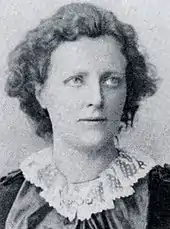
Adelheid Catharina Maria Humperdinck Wette (4 September 1858 – 9 August 1916)[1] was a German author, composer, and folklorist who is best remembered today as the librettist of her brother Engelbert Humperdinck's opera Hansel and Gretel.
Life and career
Wette was born in Siegburg, Kingdom of Prussia, the youngest sister of the composer Engelbert Humperdinck.[2] Her parents were Gustav Humperdinck, a high school teacher, and Gertrud Hartmann Humperdinck, the daughter of a cantor.[3] Adelheid was very interested in reading folktales and writing poetry.[4] In 1881, she married Dr. Hermann Wette[5] who shared her interest in folktales and had himself written two libretti for the composer Arnold Mendelssohn.[6]
Every year, Adelheid Wette wrote a play for her children to perform at a family celebration.[7] In 1888, she wrote the libretto to Engelbert's singspiel Snow White.[1]
In 1890, Adelheid wrote a version of Hansel and Gretel to be performed for her husband's birthday in May. In a letter to Engelbert in April, she asked him to compose music for five of her verses to use in the play: a cock-a-doodle-doo song (Lied); a dance song (Tanzlied); an echo song (Echolied); a forest song (Waldlied); and a lullaby (Schlummerlied). She included rhythmic suggestions for the dance song and suggested a melody of the lullaby.[8] Engelbert responded with an arrangement of songs for two voices and piano. When he adapted the folk song “Brother Come and Dance with Me” for a duet between Hänsel and Gretel in the first act, Adelheid modified the song by omitting the fifth stanza and re-arranging some lines. Over the next two years, with Adelheid and Hermann Wette's assistance,[1] Engelbert expanded Hansel and Gretel into a fully scored opera which premiered in Weimar, Germany,[9] on 23 December 1893,[10] and remains his best-known composition.
Wette's works include:
Stage works
- Frog King (1896)[11]
- Hansel and Gretel (libretto); in English: Hänsel and Gretel: a fairy opera adapted from the libretto, translated Norreys J. O’Conor, illustrated by M. L. Kirk (New York: Frederick A. Stokes Co., 1909)
- Snow White and the Seven Dwarves[1](libretto)
Poetry
- "Abends will ich schlafen gehn" [In the Evening, I Will Go to Sleep][12]
Songs
- Deutsches Kinderliederbuch [German Children's Songbook] (1903)[13]
References
- 1 2 3 4 "Adelheid Wette biography". last.fm. Retrieved 2020-09-18.
- ↑ "The Metropolitan Opera Guild" (PDF). www.metguild.org. Archived (PDF) from the original on 2020-07-23. Retrieved 2020-09-18.
- ↑ Wette, Adelheid 1858-1916 (2 July 2013). Hänsel und Gretel Märchenspiel in drei Bildern. Guth, Karl-Maria (1. Auflage ed.). Berlin. ISBN 978-3-8430-2005-3. OCLC 968225582.
{{cite book}}: CS1 maint: location missing publisher (link) CS1 maint: numeric names: authors list (link) - ↑ Fisher, Burton D. (2000-02-15). Humperdinck's Hansel and Gretel. Opera Journeys Publishing. ISBN 978-1-102-00907-8.
- ↑ Wilhelm Kosch, ed. (2011). "Wette, Adelheid". Deutsches Literatur-Lexikon [German Literature Lexicon] (in German). Vol. 31 (Werenberg–Wieding). Walter de Gruyter. col. 381. ISBN 9783110235722.
- ↑ Glauert, Amanda (2002). "Wette [née Humperdinck], Adelheid". Grove Music Online (8th ed.). Oxford University Press. doi:10.1093/gmo/9781561592630.article.O003525. ISBN 978-1-56159-263-0.
- ↑ Grun, Bernard (1955). Private Lives of the Great Composers, Conductors and Musical Artistes of the World. Library Publishers.
- ↑ "Hänsel und Gretel". Schott Music. Retrieved 24 July 2022.
- ↑ "Hänsel und Gretel (Work – Engelbert Humperdinck/Adelheid Wette)". opera-online.com. Retrieved 2020-09-18.
- ↑ "Hansel and Gretel". University of Michigan School of Music, Theatre & Dance. Retrieved 2020-09-18.
- ↑ Cohen, Aaron I. (1987). International Encyclopedia of Women Composers (Second edition, revised and enlarged ed.). New York. ISBN 0-9617485-2-4. OCLC 16714846.
{{cite book}}: CS1 maint: location missing publisher (link) - ↑ "Sammlung deutscher Gedichte 028". www.goodreads.com. Retrieved 2020-09-18.
- ↑ "Adelheid Wette". Royal Opera House. Retrieved 2020-09-18.